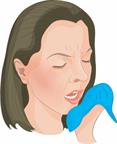Infection in the Nose, Throat, and Lungs (Viral Respiratory Infection): What to Know
A viral respiratory infection is an illness that affects the parts of your body that help you breathe, like your nose, throat, and lungs.
Some common examples are:
What are the causes?
This type of infection is caused by a germ called a virus. It's contagious, which means it spreads from person to person. You can get the virus if:
You breathe in droplets from someone who is sick. These droplets can go into the air when the person coughs, sneezes, or talks.
You come in contact with people who are sick.
You touch mucus or other fluid from a person who is sick.
What are the signs or symptoms?
Symptoms often include:
Other symptoms may include:
A fever.
Sweating or chills.
Feeling tired.
Achy muscles.
A headache.
How is this diagnosed?
A viral respiratory infection may be diagnosed based on:
How is this treated?
Treatment may include:
Antivirals. These are medicines that help fight viruses.
Expectorants. These are medicines that make it easy to breathe by helping you cough up mucus.
Decongestants. These are medicines that are sprayed into the nose. They help with a stuffy nose.
Acetaminophen or NSAIDs, such as ibuprofen, to treat a fever and pain.
Antibiotics aren't used because they don't kill viruses.
Follow these instructions at home:
Managing pain and congestion
-
Take your medicines only as told.
-
If you have a sore throat, swish and gargle with salt water and then spit it out. To make salt water, add a half to a whole spoonful of salt to a glass of warm water. Mix well.
-
Use saline nose drops to ease a stuffy nose.
-
Use a cream or balm to help heal dry skin around your nose.
- Take 2 tsp (10 mL) of honey at bedtime to lessen coughing at night.
-
Drink more fluids as told. This helps loosen up mucus. It also helps prevent dehydration, which is when there's not enough water in your body.
General instructions
-
Rest as much as you can.
-
Ask when you can go back to work or school.
-
Do not drink alcohol.
-
Do not smoke, vape, or use nicotine or tobacco.
-
Keep all follow-up visits. Your health care provider will check how you're doing and see if the treatments are working.
How is this prevented?

Contact a health care provider if:
-
Your symptoms last for 10 days or longer.
-
Your symptoms get worse over time.
-
You have very bad pain in your face or forehead.
-
Parts of your jaw or neck get very swollen.
-
You have shortness of breath.
-
You keep throwing up.
-
You feel pain or pressure in your chest.
-
You have trouble breathing.
-
You faint or feel like you may faint.
-
You feel confused.
These symptoms may be an emergency. Call 911 right away.
This information is not intended to replace advice given to you by your health care provider. Make sure you discuss any questions you have with your health care provider.
